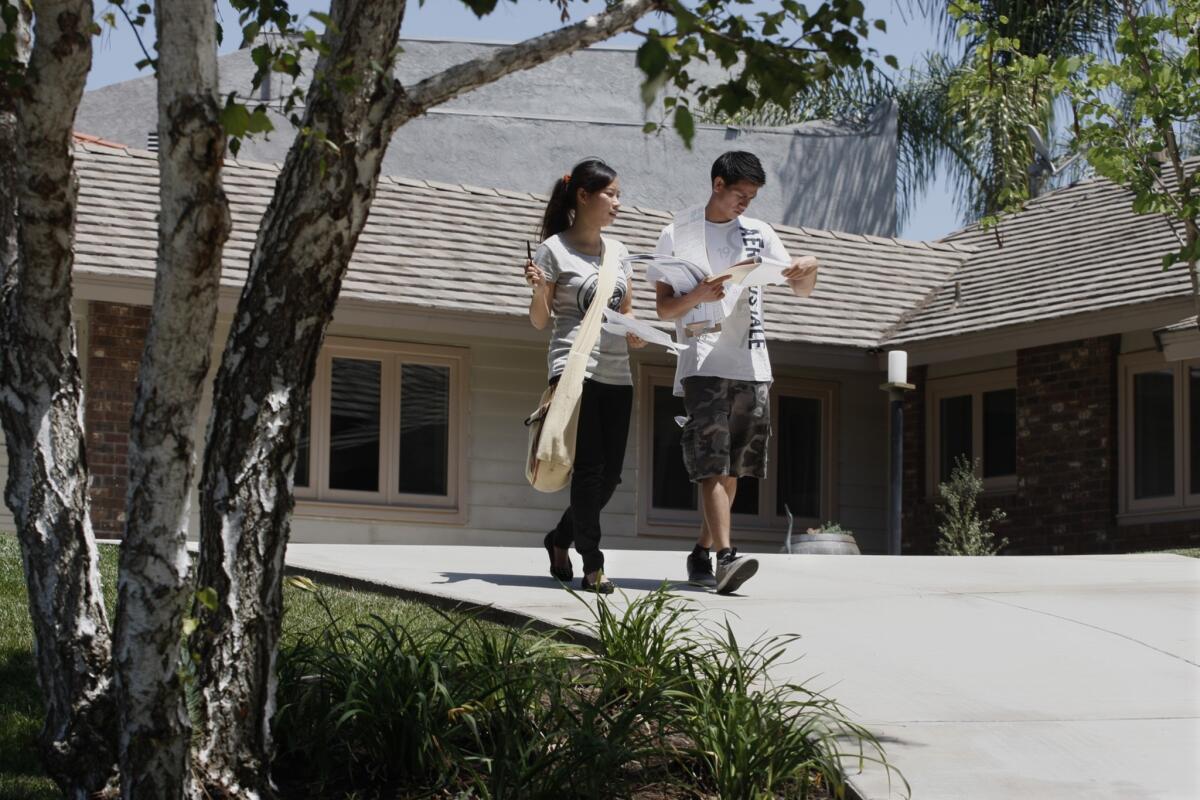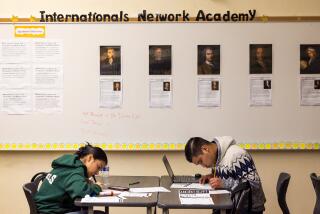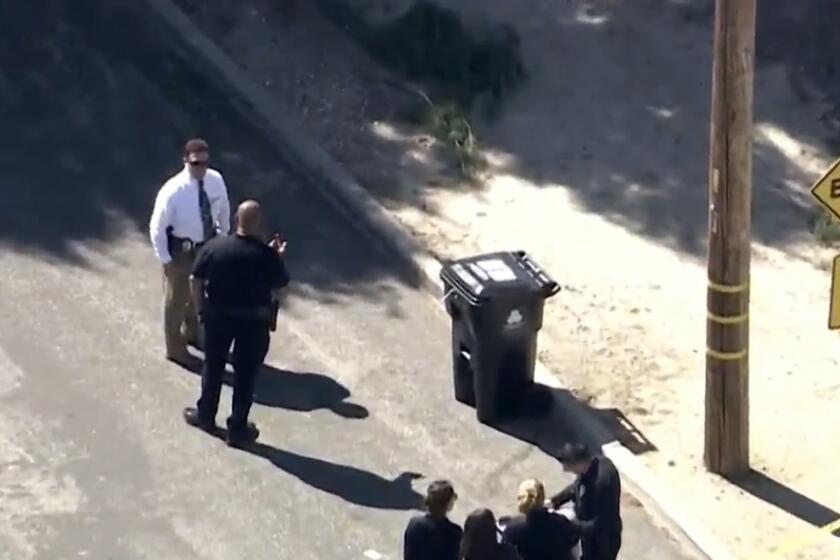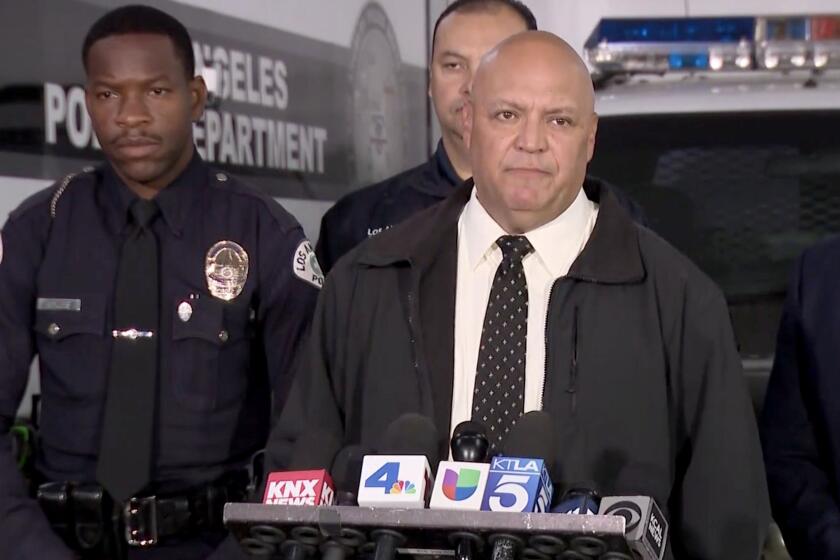Immigrant enclave isn’t pro-amnesty

In 11 terms in Congress, Rep. Ed Royce has taken a hard line on illegal immigration, earning an A-plus rating from the anti-amnesty group Numbers USA.
Earlier this year, the Fullerton Republican joined in a symbolic vote against President Obama’s deferred-action program for immigrants brought to the country illegally as children.
Even so, advocates on both sides of the debate have marked Royce as a lawmaker who could change his mind on a path to citizenship for the 11 million immigrants in the country illegally. With immigration reform stalled in the House, he is among the Republicans targeted in recent weeks with rallies, letter-writing campaigns and media advertisements during the August recess.
In large part, this is due to the ethnic makeup of Royce’s district -- 34% Latino and 28% Asian. Conventional wisdom says this heavily foreign-born demographic may turn against Royce if he does not moderate his views on immigration.
But the 39th District presents what experts called a uniquely Southern California conundrum, defying stereotypes about immigrants and their loyalties. It is majority minority yet suburban and wealthy -- the average household income is $98,000. Bisected by the Puente Hills and straddling Los Angeles and Orange counties, it includes both the Nixon presidential library and the massive hilltop Hsi Lai Buddhist temple.
The 2010 redistricting brought the Taiwanese and Chinese enclaves of Hacienda Heights, Rowland Heights, Walnut and Chino Hills into Royce’s territory. Royce has ramped up community outreach in these areas, opening an office in Rowland Heights with bilingual signs and Mandarin-speaking staffers.
Asians and Latinos in Orange County tend to be more conservative and less focused on immigration as a top concern, some experts say.
“That may give Royce the political cover necessary to maintain hard-line positions on immigration while winning a diverse constituency,” said Tom Wong, a UC San Diego political science professor who analyzes immigration votes.
In front of Fullerton City Hall earlier this month, a man interrupted an immigrant-rights rally, sidling up to the marchers and drowning out their chants with one of his own.
“Mexican nationals are stealing American benefits!” he shouted. The rally continued, with activists urging Royce to support legalizing the 11 million.
Waiting in line
On the other end of Royce’s district, in a Hacienda Heights shopping plaza catering to Chinese immigrants, Johnny Wan had little sympathy for those who didn’t wait in line, as he did. It took Wan 15 years to get a green card through his brother.
“We waited 10 to 20 years, while they wouldn’t have to wait. It’s not fair,” Wan, a Hong Kong native who owns a Chinese-language bookstore, said in Mandarin.
Royce was traveling in Southeast Asia for much of August. Through a spokeswoman, he declined to be interviewed.
“There is no question that we must fix our broken immigration system,” Royce said in a written statement. “That means implementing faster documentation processes and workable employer verification as well as effectively securing our border. Only then can we talk about a pathway to an earned legal status for adults.”
In 2006, Royce was among the Republican lawmakers who tried to do away with bilingual election ballots mandated by the Voting Rights Act. The change would have affected many voters in Royce’s district, where two-thirds of residents spoke a language other than English at home. That same year, Royce voted for an enforcement-heavy House bill that prompted immigrant-rights protests nationwide.
Yet Royce’s stances did not seriously damage his standing among voters. He won reelection that November by more than 30 percentage points.
As chairman of the House Committee on Foreign Affairs, Royce is a champion of Taiwan and a critic of Communist Vietnam and North Korea -- popular positions among his foreign-born constituents. He has long been a fixture at Asian community events.
Nearly 40% of district voters are Republican, with the rest about evenly split between Democrats and independents. One in three residents is foreign-born.
“He has a history as chair of the foreign relations committee of engaging immigrant communities on homeland issues. He needs to listen more to our priorities about domestic issues,” said Dayne Lee, a civic participation coordinator for the Korean Resource Center, which is pressuring Royce to support a path to citizenship.
Orange County’s Korean population includes working-class families who are in the country illegally, Lee said.
A rally of Catholic parishioners in front of Royce’s Brea office Tuesday drew hundreds who prayed for “those who come from other lands” and chanted “Si, se puede.”
“We don’t come to make bad things. We come for jobs and a better life and to help people in our country,” said Isabel Romero of Brea, a baby-sitter and restaurant cook who came to the U.S. legally from Mexico in 1991.
But concern for immigrants who lack legal status remains relatively muted in Royce’s district.
Jay Chen, a Taiwanese American Democrat who ran against Royce in the last election, tried to contrast his position on immigration with Royce’s. But the issue didn’t resonate with voters, Chen said. Royce’s foreign policy track record, along with endorsements from local Taiwanese American elected officials, most of whom are Republican, kept many Asian voters in his camp.
The clout of white, conservative residents remains disproportionately strong: Fewer than half of immigrants in the district are naturalized citizens, according to census data. Recent immigrants in the southern part of the district who might be turned off by Royce’s stances did not turn out in large numbers last November, Chen said.
“As long as that happens, Royce can sit pretty, vote how he’s always voted and not suffer the consequences,” Chen said.
In the long term, the 39th District will become increasingly Democratic as young Latino and Asian voters come of age, analysts predict. In the short term, Royce can vote however he wants on immigration without risking his seat, said David Wasserman, House editor for the Cook Political Report.
“As long as Royce can prove to voters that he’s fluent in their issues of concern, that’s often enough no matter how he votes on one bill,” Wasserman said. “I think he’s in a rare position where he can make up his own mind and defend it either way.”
Backing a path
In the Central Valley, home to many Latino agricultural workers who lack legal status and the farmers who rely on them for labor, some Republican House members are backing a path to citizenship.
In the strip malls of the eastern San Gabriel Valley, where Korean tofu and handmade noodles from Gansu province are among the delicacies sold, voters are more likely to know someone who waited over a decade for a green card than someone who crossed the border illegally.
Hacienda Heights print shop owner Payne Liu, who is not a U.S. citizen, waited for 10 years before getting a green card to move to the United States from Beijing.
“I think they need to take the proper path. It’s not fair to the people who are waiting,” Liu, 45, said in Mandarin. “To give it to everyone, to make everyone legal -- I don’t think that’s fair.”
On the other hand, his wife, Joanna Cho, is a citizen and a Democrat. Royce will never get her vote if he does not support legalization for the 11 million immigrants in the country illegally, Cho said.
“Why not give them the right?” she said. “This is a country of immigrants.”
Wan, the bookstore owner, wants Congress to secure the border and make sure large numbers of immigrants do not cross illegally. Then, he would be willing to consider granting citizenship to those already here.
“He needs to solve the problem so there are no more illegal immigrants,” Wan said of Royce.
“If this is the last wave, OK, then give them citizenship.”
More to Read
Start your day right
Sign up for Essential California for news, features and recommendations from the L.A. Times and beyond in your inbox six days a week.
You may occasionally receive promotional content from the Los Angeles Times.







